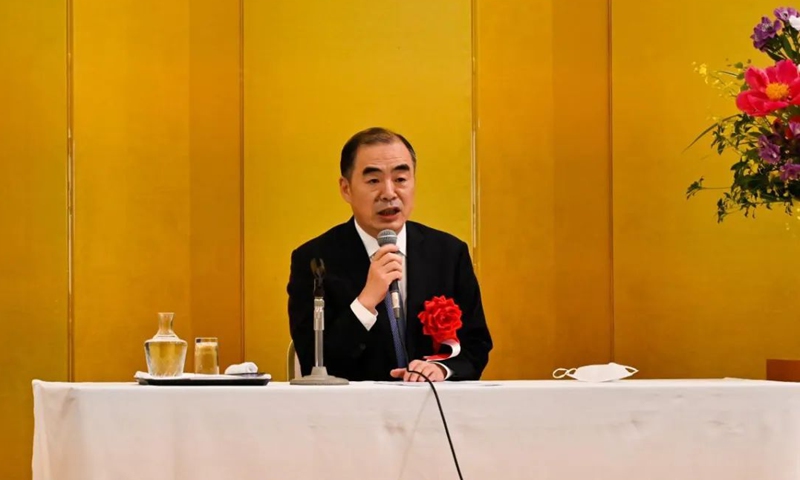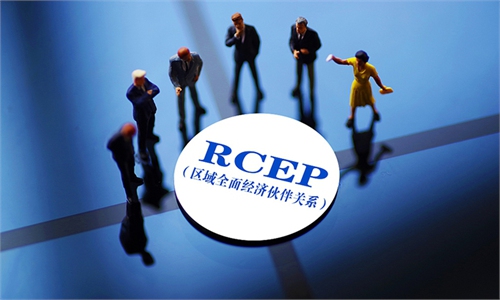China-Japan ties at a crucial crossroads; Tokyo’s handling of Taiwan question serious obstacle to bilateral relations: Chinese envoy

Photo: Wechat account of Chinese Embassy in Japan
Chinese Ambassador to Japan Kong Xuanyou said on Wednesday that the relations between China and Japan are at a crucial crossroads, as Japan, in an apparent collaboration with the US, is increasingly considering China a strategic threat. The envoy urged Japan not to cross the red line on the Taiwan question, warning a "destructive impact" on bilateral ties if the situation is not handled properly, at a conference organized by one of the Japanese associations that are friendly to China, to commemorate the 50 years of diplomatic relations between China and Japan, on Wednesday.
US Ambassador to Japan, Rahm Emanuel, praised Japanese Prime Minister Fumio Kishida's commitment to bolstering the island national defenses on Wednesday, during a public speech in Tokyo, saying that Washington would be an "everlasting Pacific presence and energy," as growing concerns of "Chinese aggression" toward the island of Taiwan remain, Japan Times reported.
Over the past month, Japan and the US have repeatedly declared their intent of boosting cooperation over the Taiwan question on multiple occasions. Both countries also supported Taiwan authorities' participation in the World Health Assembly (WHA). Kong warned that the Taiwan question is a "highly sensitive issue concerning the foundation of China-Japan relations," and it will bring a "destructive impact" on bilateral ties if it is not handled properly. He stressed that abiding by the one-China principle is the prerequisite for the normalization of China-Japan relations, which is an explicit commitment made by the Japanese government.
Currently, while the US keeps escalating situation across the Taiwan Straits, Japan has also attempted to embolden separatist forces on the island, thus creating serious obstacles for healthy China-Japan relations, Kong said, urging Japan to honor its commitment and refrain from crossing the red line on the Taiwan question.
Kong said the Asia has witnessed vigorous regional cooperation and rapid economic growth, becoming the most dynamic and promising place. However, Asia should keep vigilant and avoid threats to its hard-won peace and development momentum, such as US President Joe Biden's policy of China containment via its "Indo Pacific Strategy." Biden recently completed his first trip to Asia since taking office. One big move by the US was announcing the launch of the Indo-Pacific Economic Framework (IPEF) in Tokyo, which the Japanese government has proactively catered to and followed.
The Indo-Pacific Strategy's nature of containing China through camp division cannot be concealed, no matter how US tries to disguise it. The US spares no efforts in painting China as a common threat to regional countries, and takes it an as an excuse to encourage Japanese military buildup and create a sort of Asian NATO, essentially pulling the region into the great power game, said Kong.
Kong said that the normalization of China-Japan relations in 1972 was an important milestone in the history of bilateral relations, which completely ended confrontation and isolation against the backdrop of the Cold War. However, today, 50 years later, China-Japan relations, with old and new problems intertwined, have once again come to a crucial crossroads. "We hope both sides will make the right choice to safeguard and consolidate the hard-won peaceful development," Kong said.
Today, as two important countries in the region and the world's second and third largest economies, China-Japan relations have had and will continue to have a significant impact on the Pacific region and the world, Kong noted.
"Is China a threat to Japan? This is a fundamental question that the Japanese side must answer clearly. No matter how China develops, we have never regarded Japan as our rival or enemy. However, there is clearly a growing tendency in Japan to view China as a strategic security threat, and there are increasing rhetoric and negative actions by Japan and the US to suppress China. Both sides should be on high alert," said Kong, who urged Japan to maintain strategic rationality and soberness and to pursue a more positive policy towards China.
Kong called on both countries to boost economic and trade cooperation to inject more impetus and stability into bilateral ties. "We always regard Japan as an important partner, and welcome Japan to increase its input in China."
Relations with the US are not the whole point of Japanese diplomacy. We hope that Japan can maintain strategic autonomy and show vision and wisdom to seek a balance between the US and China. Only in this way can Japan move forward, Kong said.
Kong said he hoped disputes between China and Japan could be effectively managed, calling on the two sides to abide by the four-point principled consensus reached in recent years on proper handling of sensitive maritime issues and other conflicts, and manage disputes constructively through dialogue and consultation.
Kong also called for extensive cultural exchanges between the two countries to enhance mutual understanding, especially among the younger generations, and to reverse the public opinion decline.
Global Times

